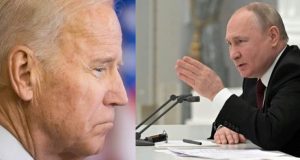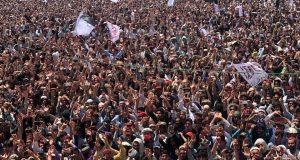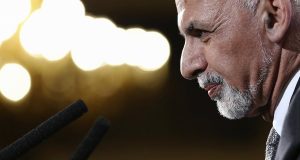 One may agree or disagree with the merger of FATA with Pakhtunkhwa depending on arguments based on nationalist approaches in support or against the process. However, there are some facts that one can not be ignored. Its true that FATA has been a semi independent region and historically been engaged with Afghanistan and British India in the pre 1947 period. While these Afghan/ Pakhtun tribes of FATA were engaged with Afghanistan for socio- cultural reasons and have played a role of King makers and breakers in Afghanistan, the same tribes were engaged with the people of present day Pakhtunkhwa for socio- cultural, political and economic reasons. Some of the tribal maliks would get allowances from the Afghan Amirs, others would demand it from the British for being loyal or peaceful with the former and the later. The tribes were under the nominal control and influence of Afghanistan due to their shared history and geography. That is why, the tribes played a crucial role in the third Anglo- Afghan war led by Amanullah Khan in 1919. After his abdication of the throne, the new Afghan Amir Nadir became King of Afghanistan in 1929 only with active support of 12000 strong tribal Lashkar from Waziristan.
One may agree or disagree with the merger of FATA with Pakhtunkhwa depending on arguments based on nationalist approaches in support or against the process. However, there are some facts that one can not be ignored. Its true that FATA has been a semi independent region and historically been engaged with Afghanistan and British India in the pre 1947 period. While these Afghan/ Pakhtun tribes of FATA were engaged with Afghanistan for socio- cultural reasons and have played a role of King makers and breakers in Afghanistan, the same tribes were engaged with the people of present day Pakhtunkhwa for socio- cultural, political and economic reasons. Some of the tribal maliks would get allowances from the Afghan Amirs, others would demand it from the British for being loyal or peaceful with the former and the later. The tribes were under the nominal control and influence of Afghanistan due to their shared history and geography. That is why, the tribes played a crucial role in the third Anglo- Afghan war led by Amanullah Khan in 1919. After his abdication of the throne, the new Afghan Amir Nadir became King of Afghanistan in 1929 only with active support of 12000 strong tribal Lashkar from Waziristan.
After becoming the King, Nadir Shah turned to be pro British and not only tried to propagate against the Pakhtun nationalists of Pakhtunkhwa for being pro Congress rather pressurized the Afghan tribes on both sides of the Durand Line to leave their anti British attacks in the tribal area. After his death in 1933, his son Zahir Shah played the same role and the Faqir of Ipi or Haji Sahib was not only discouraged to cross the Durand Line rather tried to convince him for making peace with the British. However, Haji Mirzali Khan refused to make peace with the British who had occupied their lands. The Lashkars of Haji Mirzali Khan had compelled the British by attacking them in Bannu and D.I. Khan that the later brought 40000 troops or half of the British India force to Waziristan.
While the Pakhtun nationalists of Pakhtunkhwa were propagating against the British and unification of the Pakhtuns who were living under the influence of the British, the Afghan rulers were propagating in favour of the imperialists in the region hoping that they will get the tribal territories back at the time of British withdrawal from India.
The Pakhtuns of the tribal areas could have been unified by the Afghan government of Nadir Shah and Zahir Shah just like Amanullah Khan did and succeeded in 1919 against the British but they did not. On the contrary, they could not even strongly protest against heavy bombing of the British destroying the Mehsud, Wazir, Mohamand and Afridi villages who were being given collective punishment for their anti British activities in the area throughout the 1930s. Its true that the Afghan rulers were weak and could not match the mighty British forces, but they did not try to unify the tribes against the British rule in the Afghan/ Pakhtun regio, but maintained some kind of influence in the area by enlisting the Wazir and Mehsud in the Afghan army and giving allowances to influential tribal maliks and tribes for being loyal to them and the British. It is interesting to not that however, the Pakhtun tribes like Zadran, Khostwal, Tani, Mangal and others across the Durand Line actively supported the Lashkars of Haji Mirzali Khan and other hostile groups against the British which shows that Pakhtuns on both sides of Durand Line shared their happiness, agonies despite being kept separated from each other.
Coming towards the settled districts of Khyber Pakhtunkhwa, the tribes had historical links with Pakhtuns of the settled districts. Some of the tribes were ‘Dwa Kora’ having their homes both in the agencies as well as the districts. Bacha Khan has led the foundation of first Azad School in Malakand Agency which was demolished by the British. Similarly, the semi independent tribes in the tribal area retaliated against the British atrocities in Peshawar and Bannu in April 1930 where hundreds of peaceful protesters were killed during the civil disobedience movement. While the wazir, Mehsud and Bhittanis and other tribes attacked British installations near Bannu and D.I. Khan, a strong Lashkar of Afridis marched on Peshawar and entered Bala Hisaar fort after those killings of the Pakhtuns. The fight continued for six months and many villages were heavily bombed compelling the tribes to come to terms. The struggle of the Pakhtun nationalists of the province and the tribal territory was based on their common ethnicity, religion, socio- political and economic reasons. They were confronted by one mighty British force and were struggling against imperialism. On coming to power, the Pakhtun nationalists of the NWFP (Pakhtunkhwa) supported the cause of the tribes on all India level. Bacha Khan and his elder brother, Dr. Khan sahib and chief minister of the then NWFP propagated against the inhuman bombing of the British in the tribal areas and exposing their atrocities not only in India rather in England. The indiscriminate bombing and destroying villages, killing innocent women and children was criticised in the Indian press and England. Bacha Khan met the British governor George Cunningham in 1939 and tried to convince him about the unity of the Pakhtuns. But sadly enough, he was not even allowed to visit the tribal territory just because, the British wanted them to be kept isolated and manipulate events in the interest of the British Indian empire.
Unfortunately, the same British policies were followed by the Pakistani authorities and the People of FATA has been used for protecting national interests. Their separation has caused destruction of the Pakhtuns throughout the region. To keep the Pakhtuns living within the Pakistani federation separated for long or keeping the status quo would be more dangerous not only for the Pakhtuns of Pakistan but also the Pakhtuns of Afghanistan. Merging FATA with Pakhtunkhwa may not solve their problems. But it is indeed a positive step in that direction. The Pakhtuns in Pakistan should try to unify themselves and struggle constitutionally if they wish their voice to be heard. Disunity among them or going to violence can not bring them out of the problems they are facing for too long.
Writer: Naeemullah Khan Dawar
The writer is a PhD student in the Department of History at Quaid-i-Azam University, Islamabad. He hails from North Waziristan Agency. He can be reached at
naeemullah1984@yahoo.com
THE PASHTUN TIMES
 Pashtun Times Latest News
Pashtun Times Latest News



